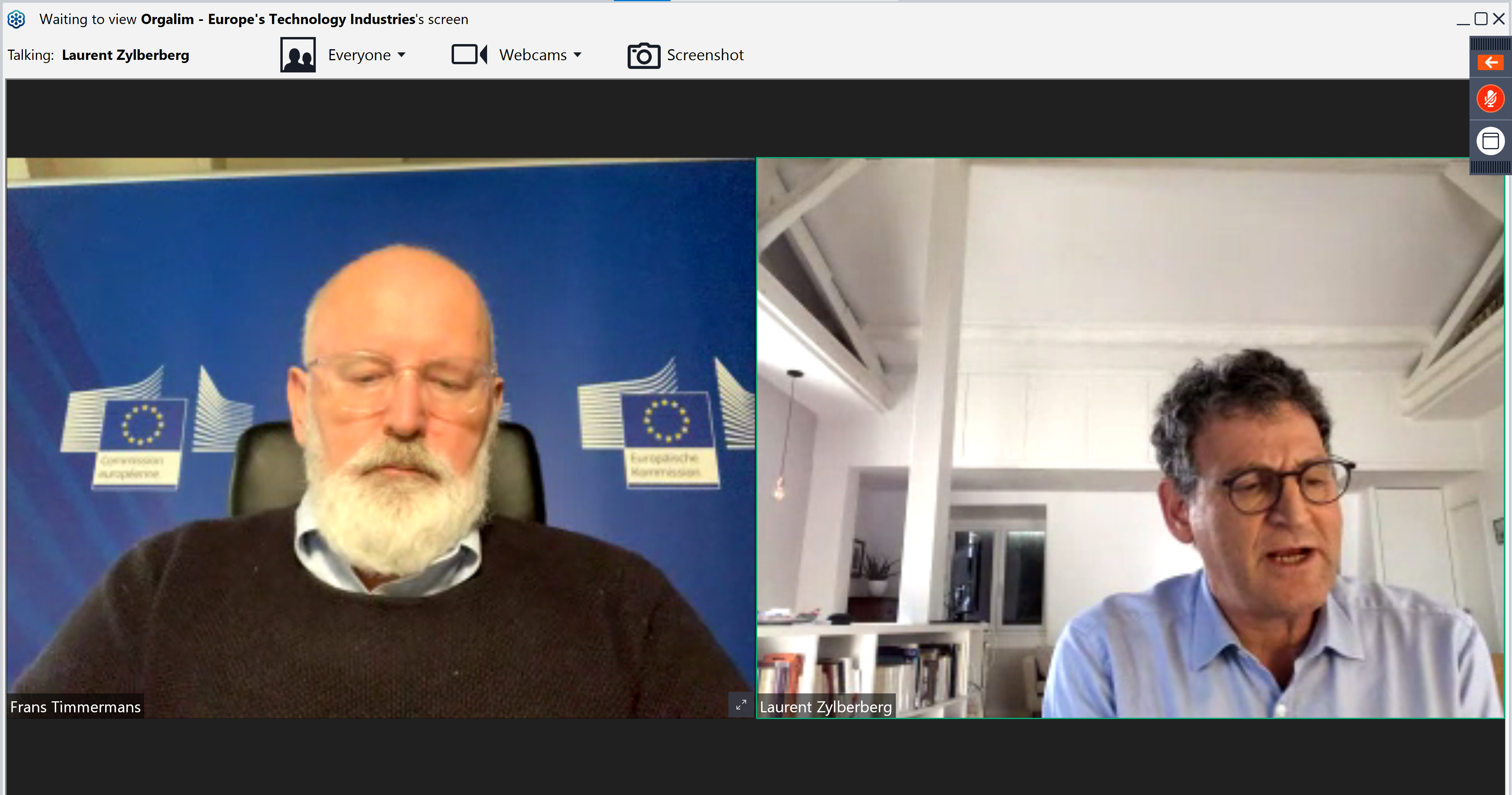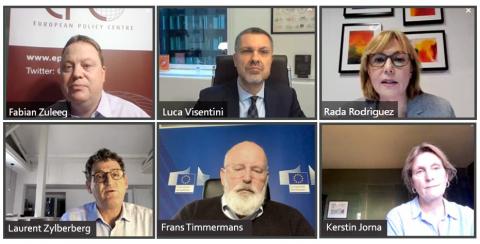On 26 October 2020, the “Sustainable, Long-term investments & Competitive European Industry Intergroup” in the European Parliament held its inaugural conference. Overseen by Vice-President Frans Timmermans, this launch event focused on the necessary steps which the EU needs to prioritise in order to become more green, digital and resilient.
Co-Chair Dominique Riquet opened this high-level conference by presenting the intergroup and its underlying goals and values within the current social and economic context. Besides the stimulus provided by national and European recovery plans, companies will need to rely on diversified financial sources, hence the need for an investment-oriented EU budget.
As part of the event’s keynote speech, Frans Timmermans, Executive Vice-President of the Commission for the European Green Deal, spoke of the multiple tasks Europe must overcome , namely the unforeseen health and economic crisis caused by the Covid pandemic, the ever-growing issue of climate change and what many believe to be the eve of an industrial revolution. Long-term and sustainable investments via public and private capital will be key when facing these challenges. The European Commission will offer the necessary predictability, as illustrated by the Climate Law which looks to preserve the overall objective of climate neutrality by 2050. Along infrastructure and R&D, the Executive Vice-President also highlighted the importance of investing in skills.
During her intervention, Co-Chair Maria da Graça Carvalho (EPP) emphasised the importance of research and technology in order to achieve said sustainability targets whilst also maintaining employment and overall social well-being. Co-Chair Simona Bonafé (S&D) followed up on this point by highlighting the need for long-term investments as well as consistent and forward-looking policies as the main tools for a sustainable recovery.
Today’s event shows the long-lasting and welcome involvement of the European Parliament for sustainable and long-term investments. They are by no means an abstract notion: it is about a green recovery, on the ground, for its citizens”. This was said by Laurent Zylberberg, President of ELTI, while pledging support of ELTI members to the tireless work being done by the Intergroup during its previous mandate. While he regretted the recent cuts to EU investment programmes, L. Zylberberg welcomed the fact that NPBIs’ role is now clearly recognised by the EU institutions and that they are an integral part of the European and national discussion on Recovery. Rada Rodriguez, President of Orgalim, welcomed the creation of the Intergroup and stressed the expertise which European industry will provide on digitalisation as an important component of the EU industrial strategy.
It was then time for the debate, moderated by Fabian Zuleeg (European Policy Centre), and which was dedicated to the role of long-term, sustainable investments and industrial policy for the recovery of Europe.
Director General of DG Grow Kerstin Jorna and European Trade Union Confederation (ETUC) Secretary General Luca Visentini then joined the debate by conferring the best means to make certain commitments a reality.
“The EU-recovery plan is not about spending; it is about investing sustainably. By harnessing the full power of the single market, it will boost the sustainable transition!”, as quoted by Kerstin Jorna. Luca Visentini acknowledged the magnitude of the Recovery plan and the green and digital aspect of the Transition. He warned, however, against opposing a green and brown economy and called for a strong accompaniment of workers during this transition and close association of social partners at all levels for a successful fair transition. With regards to EU-led investments, Visentini called for increased monitoring of their non-financial impact.
Rada Rodriguez, President of Orgalim, expressed to add transversal, horizontal technologies to the matrix developed by the European Commission for its industrial policy.
Laurent Zylberberg elaborated on the persistent state of low investment since 2007, in spite of high liquidity and the strong need for investments throughout Europe. Within the current risk-averse regulatory framework, NPBIs have a role in de-risking investments, thus enabling private investments with positive externalities. He called for a Recovery plan which should follow a bottom-up approach. As such, NPBIs, are best placed to channel capital to the most impactful projects thanks to their extensive capillary network across the EU.
Co-Chair Maria da Graça Carvalho (EPP) concluded the session by inviting all stakeholders to keep up to date with all the upcoming activities of the Intergroup.
This Intergroup, which is chaired by Dominique Riquet (RE), Simona Bonafè (S&D) and Maria da Graça Carvalho (EPP), takes over the formerly-named ‘Long-term Investment & reindustrialisation’ European Parliament Intergroup (2014-2019), officially recognised as the best platforms to better grasp the pluri-dimensional concept of long-term and sustainable investments and Industrial policy. The ELTI association, together with the Brussels liaison offices of its members BGK, Bpifrance, Caisse des Dépôts, Cassa Depositi e prestiti, Invest-NL and KfW, are mobilised to manage the Intergroup’s Secretariat in close coordination with the Committee for European Construction Equipment (CECE) and Orgalim for the industrial policy.
For further details: www.investmentindustryintergroup.eu and the Twitter account @SLICEI.

